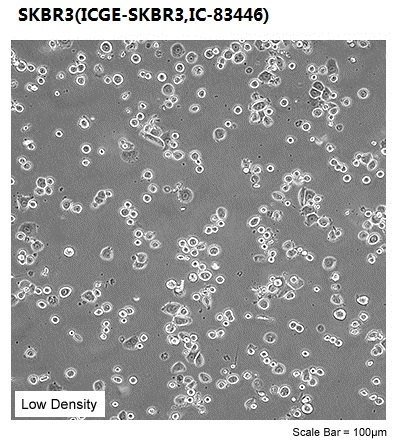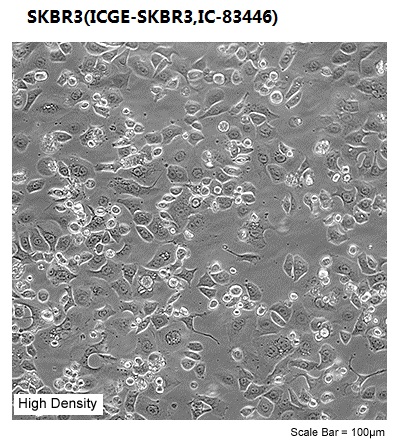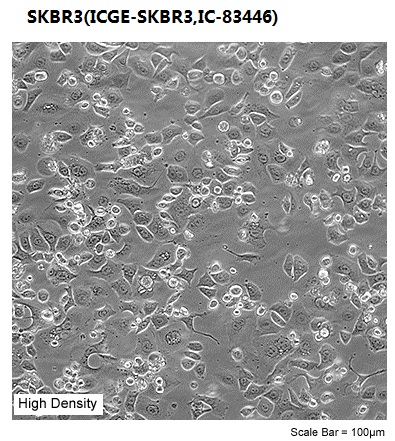


Overview
| Permits and Restrictions | |
|---|---|
| Organism | Homo sapiens, human |
| Tissue |
mammary gland/breast; derived from metastatic site: pleural effusion
|
| Product Format | frozen |
| Morphology | epithelial |
| Culture Properties | adherent |
| Biosafety Level |
1
Biosafety classification is based on U.S. Public Health Service Guidelines, it is the responsibility of the customer to ensure that their facilities comply with biosafety regulations for their own country. |
| Disease | adenocarcinoma |
| Age | 43 years |
| Gender | female |
| Ethnicity | Caucasian |
| Applications |
This cell line is suitable as a transfection host.
|
| Storage Conditions | liquid nitrogen vapor temperature |
Properties
| Karyotype | This is a hypertriploid human cell line with the modal chromosome number of 84, occurring in 34% of cells. Cells having 80 chromosomes also occurred at a high rate (28%); the higher ploidy cells occurred at 7.3%. This cell line has a very complex chromosome composition. Thirty-five to 40% of chromosomes in a cell complement with a modal chromosome number of 84 consisted of structurally altered marker chromosomes. Several markers are longer than chromosome N1. The origins of most of these markers, however, are not clear. Some markers may have at least three individual chromosome segments. The markers [i.e., ?der(1)t(1;21) (p13;q21) [or ?t(1q21q)], ?del(2) (q13), and t(7pter--cen--?), present in some cells only] were the only ones in which portions of chromosome segments could be identified. Most cells had about three normal X chromosomes and five or more N7. The structurally normal N1, N14 and N17 were generally absent. |
|---|---|
|
|
|
| Derivation | This cell line was derived by G. Trempe and L. J. Old in 1970 from pleural effusion cells of a patient, a White, Caucasian female, age 43, blood type A+, who had been treated with radiation, steroids, cytoxan and 5-fluorouracil. |
| Clinical Data |
43 years
Caucasian
female
|
| Antigen Expression |
Blood Type A; Rh+; HLA A11, Bw22(+/-), B40, B18
|
| Tumorigenic | Yes |
| Effects |
Yes, in nude mice; forms poorly differentiated adenocarcinoma
|
| Comments |
The patient, a White, Caucasian female, age 43, blood type A+, had been treated with radiation, steroids, cytoxan and 5-fluorouracil. No virus particles.
Ultrastructural features include microvilli and desmosomes, glycogen granules, large lysosomes, bundles of cytoplasmic fibrils.
The SK-BR-3 cell line overexpresses the HER2/c-erb-2 gene product.
|
Background
| Complete Growth Medium |
The base medium for this cell line is ATCC-formulated McCoy''''''''s 5a Medium Modified, Catalog No. 30-2007. To make the complete growth medium, add the following components to the base medium: fetal bovine serum to a final concentration of 10%. |
|---|---|
| Subculturing |
Volumes are given for a 75 cm2 flask. Increase or decrease the amount of dissociation medium needed proportionally for culture vessels of other sizes. Corning® T-75 flasks (catalog #430641) are recommended for subculturing this product.
Subcultivation Ratio: A subcultivation ratio of 1:2 is recommended
Medium Renewal: 2 to 3 times per week
|
| Cryopreservation |
Freeze medium: Complete growth medium, 95%; DMSO, 5%
Storage temperature: liquid nitrogen vapor temperature
|
| Culture Conditions |
Atmosphere: air, 95%; carbon dioxide (CO2), 5%
Temperature: 37��C
|


